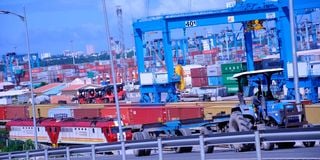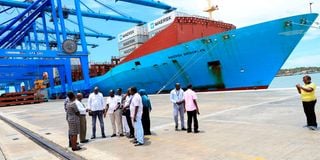Premium
Mombasa starts to benefit from push of port revenue sharing

The port of Mombasa is a crucial facility for the East African region as it serves at least six countries.
The push and pull between Mombasa County and the national government over revenue sharing at the Mombasa port appears to be reaching a consensus after the county was given the green light to start charging ships calling at the port.
The county has been given the go-ahead to charge ships for waste disposal, a move that will see the port city collect millions of shillings annually, significantly increasing its revenue.
In a letter from Kenya Ports Authority (KPA) Managing Director William Ruto, Mombasa County has been allowed to charge about Sh300 per 100 gross tonnage with a minimum of Sh30,000 per vessel.
An average of 1,500 vessels call at the Mombasa port annually.
“With reference to your letter CGM/CS/CORR/7.23/NBS-JF of August 2023 and following our discussion, I wish to advice that the Authority has considered your request to earn revenue from ships calling at the port of Mombasa regarding matters waste collection and management and herewith recommends rates below subject to public participation and approval by relevant bodies,” said Capt Ruto in his communication to the county government.
In the agreement, however, the KPA has exempted vessels owned or operated by the government that are not engaged in commercial trade, vessels owned or operated by public authorities and public ferries that operate exclusively within the port limits.
Those who will not pay for the service include vessels at stream or anchorage and dredgers whose normal course of navigation does not extend beyond the port boundaries.
The announcement comes as President William Ruto prepares for a five-day tour of the Coast, following the expiration of the 90-day deadline to update the 21 points he asked port stakeholders and other government agencies to revise to improve port efficiency and create conducive working conditions.
On Thursday, the Kenya Maritime Authority (KMA) signed the recommendations of the President's Sub-County Technical Committee for implementation where the government removed a number of arbitrary charges introduced by shipping lines.
Some of the charges that have been revoked include equipment management fees, ex border charges, late documentation per bill of lading, container cleaning fees and import documentation fees, which have now been revoked with immediate effect.
But the move has not gone down well with the Kenya Ships Agents Association (KSAA), which has accused the government of not involving it in such important decisions.
Chief Executive Officer Juma Tellah said there was a need to look at issues affecting the port holistically, rather than singling out specific issues affecting one stakeholder.
“Regulating shipping lines’ destination charges will hurt the Kenyan economy... Kenya has a free-market economy that encourages investment and is one of the main reasons multi-national companies choose Kenya for their regional headquarters. Over-regulation will discourage this because should the shipping industry be regulated the fear is that other sectors/industries will follow this example,” said Mr Tellah.
Mr Tellah also dismissed minimum charges by the Kenya International Freight and Warehousing Association (Kifwa), saying this will make cost of freight more expensive.
“Over-regulating the shipping industry will not make Mombasa port more competitive as freight rates will be increased to compensate and therefore end users will pay the same. Freight rates are collected internationally thus this increase in freight rates will not benefit the Kenyan economy but present destination charges are paid to companies incorporated in Kenya (Ship Agents), that pay Kenyan taxes and employ Kenyans,” said Mr Tellah.

The Port of Mombasa on March 28, 2023.
West European Container Lines regional managing director Roger Dainty urged the government to reconsider the move to scrap the charges, saying some of them shield shipping lines from recourse in case of container loss.
“Container cleaning charges was introduced after it became impossible to clean containers in Kenya and then ferry them abroad, since it results in double cleaning after its destination. Also container deposit charges help to cushion shipping lines in case of container damage or loss,” said Mr Dainty.
On the approved charges, Mr Dainty said: "We are seeking legal advice."
But Kifwa has continued to push for more regulation, asking the KMA to capture the technical committee resolution on Agenda 3, which restricts shipping lines from engaging in clearing and forwarding either directly or through affiliates.
“Whereas you have captured the abuse of dominance in paragraph 2, line 2, you have omitted it on the resolution despite our continued reminders. Kindly include the resolution in the notice as resolved by the technical committee,” Kifwa said in a notice to KMA.





